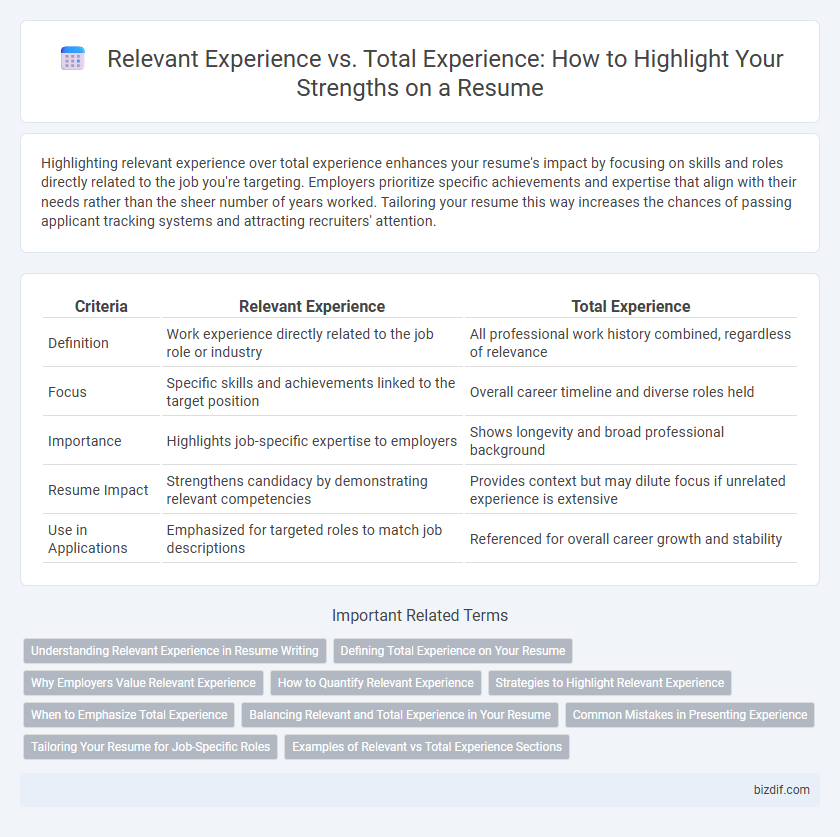Highlighting relevant experience over total experience enhances your resume's impact by focusing on skills and roles directly related to the job you're targeting. Employers prioritize specific achievements and expertise that align with their needs rather than the sheer number of years worked. Tailoring your resume this way increases the chances of passing applicant tracking systems and attracting recruiters' attention.
Table of Comparison
| Criteria | Relevant Experience | Total Experience |
|---|---|---|
| Definition | Work experience directly related to the job role or industry | All professional work history combined, regardless of relevance |
| Focus | Specific skills and achievements linked to the target position | Overall career timeline and diverse roles held |
| Importance | Highlights job-specific expertise to employers | Shows longevity and broad professional background |
| Resume Impact | Strengthens candidacy by demonstrating relevant competencies | Provides context but may dilute focus if unrelated experience is extensive |
| Use in Applications | Emphasized for targeted roles to match job descriptions | Referenced for overall career growth and stability |
Understanding Relevant Experience in Resume Writing
Understanding relevant experience in resume writing highlights the specific skills and roles directly related to the job applied for, making the candidate's qualifications clearer to employers. Focusing on relevant experience over total experience streamlines the resume, showcasing expertise that aligns with the job description and industry standards. This targeted approach increases the chances of passing applicant tracking systems and capturing the attention of hiring managers.
Defining Total Experience on Your Resume
Total experience on your resume refers to the cumulative amount of time you have spent working across all roles and industries, showcasing your overall career duration. It includes every position held, regardless of relevance to the job you're applying for, highlighting your broad work history and professional development. Clarifying total experience helps employers understand your career longevity and transferable skills beyond specific industry expertise.
Why Employers Value Relevant Experience
Employers prioritize relevant experience because it directly demonstrates a candidate's proficiency in skills and tasks essential to the specific job role, reducing onboarding time and increasing productivity. While total experience reflects overall work history, relevant experience highlights practical knowledge applicable to the position, ensuring alignment with company goals and industry standards. Recruiters assess relevant experience to predict job performance, problem-solving ability, and adaptability within the particular work environment.
How to Quantify Relevant Experience
Quantifying relevant experience involves identifying specific roles, projects, and skills directly related to the target job and measuring the time spent or achievements in those areas. Use metrics such as years, months, or specific accomplishments like completed projects, performance improvements, or certifications that demonstrate proficiency. Emphasizing relevant experience over total experience enhances resume impact by aligning expertise with employer needs and job requirements.
Strategies to Highlight Relevant Experience
Highlighting relevant experience involves tailoring your resume to emphasize roles and skills directly aligned with the job description, ensuring recruiters see your suitability immediately. Use targeted keywords and quantify achievements in relevant positions to demonstrate impact and expertise effectively. Prioritize recent and industry-specific experiences over total years worked to create a focused and compelling professional narrative.
When to Emphasize Total Experience
Emphasizing total experience is crucial when applying for senior roles or industries valuing long-term career growth, as it highlights overall expertise and reliability. Recruiters often prioritize total experience to assess an applicant's maturity, transferable skills, and consistency across diverse roles. Showcasing total experience alongside relevant experience demonstrates a comprehensive professional background, strengthening a candidate's credibility.
Balancing Relevant and Total Experience in Your Resume
Balancing relevant experience and total experience in your resume enhances clarity and impact by showcasing the skills most aligned with the job while demonstrating overall professional growth. Highlight roles and accomplishments directly related to the position, but include a concise summary of total years to convey depth and reliability. This strategic emphasis helps recruiters quickly identify your suitability and long-term value within the industry.
Common Mistakes in Presenting Experience
Misrepresenting relevant experience as total experience often dilutes a resume's impact and misleads recruiters about a candidate's true qualifications. Common mistakes include inflating years of experience by mixing unrelated roles and failing to highlight specific skills aligned with the job description. Clear differentiation between relevant expertise and overall work history enhances credibility and improves the chances of passing applicant tracking systems.
Tailoring Your Resume for Job-Specific Roles
Tailoring your resume by emphasizing relevant experience over total experience significantly boosts your chances in job-specific roles, as recruiters prioritize skills and accomplishments directly aligned with the position requirements. Highlighting role-specific achievements and industry-related expertise demonstrates a clear match, making your application stand out among generic submissions. Customizing experience sections to each job description enhances keyword optimization for applicant tracking systems (ATS) and increases interview call rates.
Examples of Relevant vs Total Experience Sections
Relevant experience highlights specific roles and skills directly aligned with the job description, such as managing digital marketing campaigns for a technology company, while total experience encompasses all professional history, including unrelated positions like customer service or retail. For example, a candidate applying for a software engineering role might list relevant experience detailing programming projects, agile methodologies, and software testing, whereas total experience would also include prior jobs unrelated to software, like administrative assistance. Prioritizing relevant experience sections enables recruiters to quickly assess qualifications pertinent to the role, improving the chances of progressing in the hiring process.
Relevant Experience vs Total Experience Infographic

 bizdif.com
bizdif.com